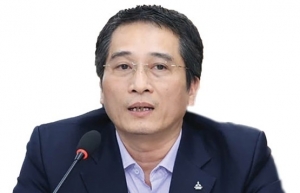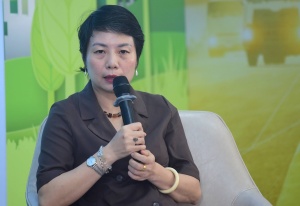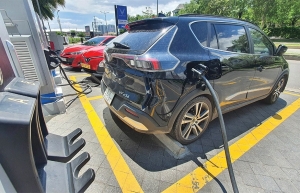Progressive strategy will win in electric vehicle market
What are the advantages of Vietnam’s electric two-wheeler (E2W) vehicle ecosystem compared with other Southeast Asian markets?
A rapidly growing economy coupled with a strong push to adopt electric vehicles (EVs) by the Vietnamese government has resulted in the country having one of the highest adoption rates of E2Ws in Southeast Asia.
 |
| Hoai-Phuong Vu, business development regional manager of Southeast Asia at InfraCo Asia under the Private Infrastructure Development Group |
In the past few years, E2W sales in Vietnam increased significantly from 257,000 units in 2018 to 484,000 units in 2023, achieving a compound annual growth rate of 13.4 per cent per annum. By comparison, in 2023, Indonesia and Thailand sold 23,000 and 22,000 units, respectively.
Over the past two decades, Vietnam has taken a number of steps that have served as enablers for the growth of the e-mobility ecosystem. Under the Paris Agreement, Vietnam has pledged to reduce greenhouse gas (GHG) emissions to 9 per cent by 2030 in comparison to the business-as-usual scenario, and achieve net-zero emissions for the transportation sector by 2050.
Almost 20 years ago, the Vietnamese Ministry of Industry and Trade acknowledged the need for the research and manufacturing of high-quality, clean-fuel motorcycles. In subsequent years, the government introduced multiple resolutions and decisions such as curbing the issuance of vehicle numbers for motorised three-wheelers; calling for increased production of eco-friendly automobiles; encouraging research into electric passenger travel modes; and pushing for increased use of biofuels and clean fuels in transportation.
In 2022, the government built on this by emphasising expanded EV manufacturing capabilities, charging station networks, and the capabilities of the EV battery industry.
As a result, today we can see many brands competing in the e-mobility sector including Dat Bike, VinFast, Yadea, Dibao, and Anbico. Within this sector, only Dat Bike and VinFast produce E2Ws with top speed above 55km per hour.
Why did InfraCo Asia decide to invest in Vietnam’s E2W ecosystem and Dat Bike specifically?
We are committed to delivering action on climate and nature, together with sustainable development, through new and improved access to infrastructure. Our 2030 strategy looks to mobilise finance and accelerate impact in key sectors, including electric mobility, in emerging markets across South and Southeast Asia and Sub-Saharan Africa.
We have invested in Vietnam’s E2W ecosystem because of the country’s strong focus on e-mobility adoption, its growing consumer segment, and the opportunity to partner with a vertically integrated Vietnamese EV company that is poised for growth.
Dat Bike differentiates itself from competitors with the following factors. First is performance – high speed, long range, and high power. Its Quantum has an exceptionally long range of 270km, which is almost double the range of its competitors’ vehicles. Its average charging time could reach one hour per 100km, which is less than half of the competitors’ charging time.
The Quantum is also one of only two models available in Vietnam that has a max power above 7kW, providing strong power that is comparable to traditional internal combustion engine powered E2Ws.
Second is cost-effectiveness, as Dat Bike’s motorbikes are close to the cost of traditional engine options available in Vietnam. Third is its high localisation rate, as its products are designed for Vietnamese consumers, with parts sourced from local suppliers. A remarkable 80.3 per cent of vendors and 90.1 per cent of input materials originate from Vietnam.
Another factor is its robust research and development (R&D). An increasing number of Dat Bike parts are being produced in-house. Starting from 2025, Dat Bike will produce its own motors.
What are your recommendations for Vietnamese companies to step up their game to drive greater EV adoption?
While Vietnam’s e-vehicle adoption has grown in market share since 2018, EV manufacturers require catalytic capital to meet the projected growth in demand. This additional investment should be applied to the scaling up of R&D and local production capacity.
Furthermore, with increased adoption, the wider ecosystem – including charging station networks, long-lasting battery solutions, and e-waste management facilities – are areas that would require parallel growth to enable a seamless shift towards an e-mobility future.
Private sector investors play a big role in market transformation. In the case of our partnership with Dat Bike, we provided the company with a $4 million convertible loan that will allow them to more than double their production capacity through facility expansion, tool optimisation and increased automation. This, in turn, will fuel Dat Bike’s growth strategy and will position the company favourably when they look to raise more funds in the near future.
Similarly, Vietnamese companies in the ecosystem can consider tapping into available catalytic funds to improve existing systems and processes in agreement with international standards, thereby attracting greater private sector investment to fuel their endeavours.
 | EV strategy must prioritise keeping the pace globally Under Vietnam’s vehicle industry development strategy, electric vehicles (EVs) require robust support from government policies to contribute effectively to the country’s net-zero commitment. |
 | Proposals looked at to change registration fees for certain EVs The Ministry of Finance has proposed a decree that offers high registration fee incentives for electric vehicles (EVs), such as a 3-year exemption from registration fees, followed by a 50 per cent reduction for the next two years. |
 | MoT takes the wheel in EV promotion The Ministry of Transport has proposed policies to accelerate the transition to electric vehicles, which are expected to significantly advance the greening of Vietnam’s road transport sector. |
What the stars mean:
★ Poor ★ ★ Promising ★★★ Good ★★★★ Very good ★★★★★ Exceptional
Related Contents
Latest News
More News
- A golden time to shine within ASEAN (February 19, 2026 | 20:22)
- Vietnam’s pivotal year for advancing sustainability (February 19, 2026 | 08:44)
- Strengthening the core role of industry and trade (February 19, 2026 | 08:35)
- Future orientations for healthcare improvements (February 19, 2026 | 08:29)
- Infrastructure orientations suitable for a new chapter (February 19, 2026 | 08:15)
- Innovation breakthroughs that can elevate the nation (February 19, 2026 | 08:08)
- ABB Robotics hosts SOMA Value Provider Conference in Vietnam (February 19, 2026 | 08:00)
- Entire financial sector steps firmly into a new spring (February 17, 2026 | 13:40)
- Digital security fundamental for better and faster decision-making (February 13, 2026 | 10:50)
- Aircraft makers urge out-the-box thinking (February 13, 2026 | 10:39)

 Tag:
Tag:

















 Mobile Version
Mobile Version